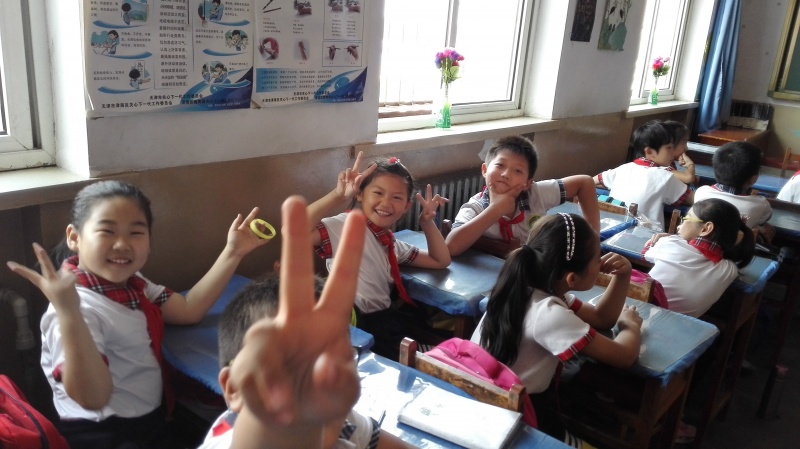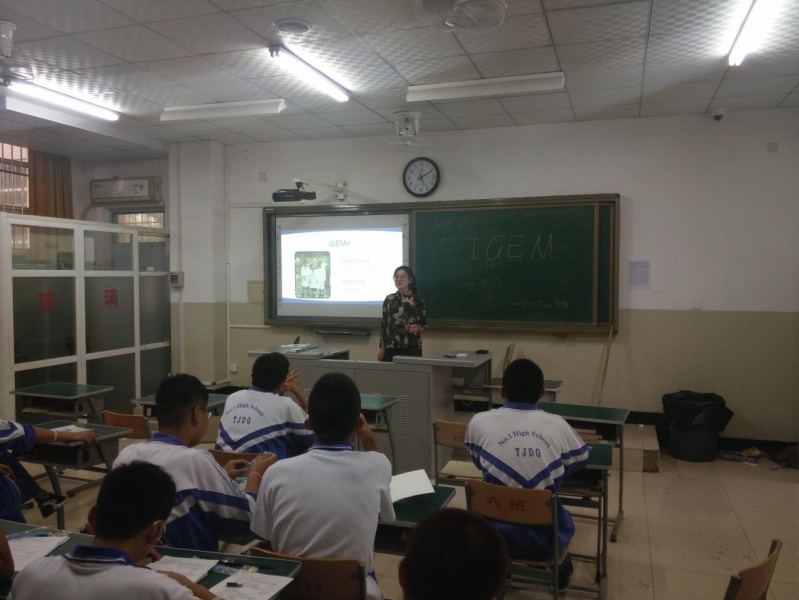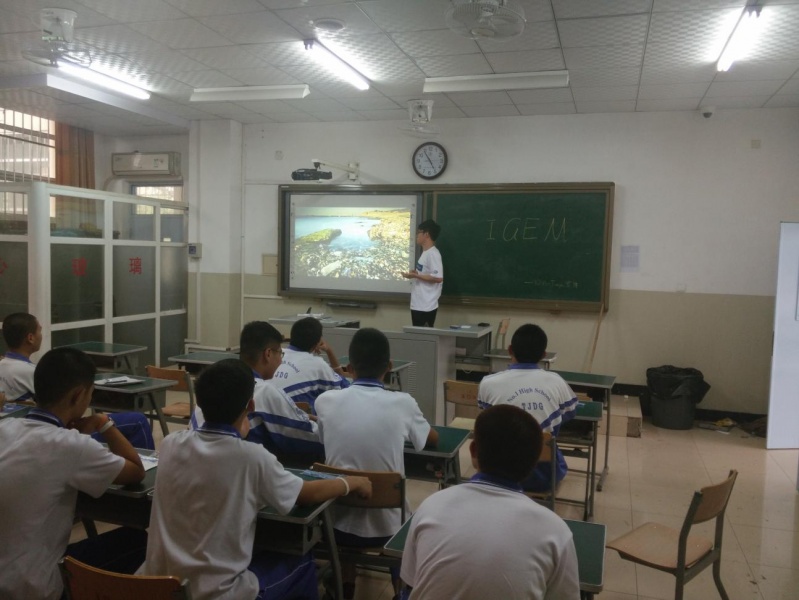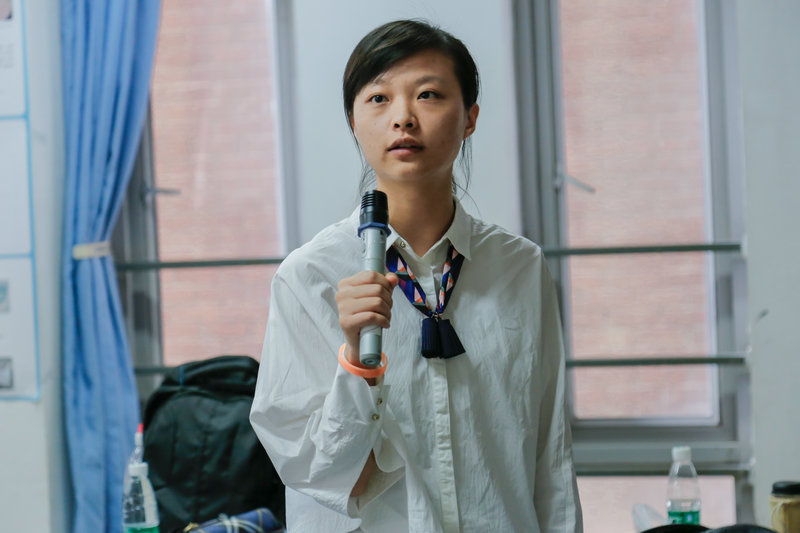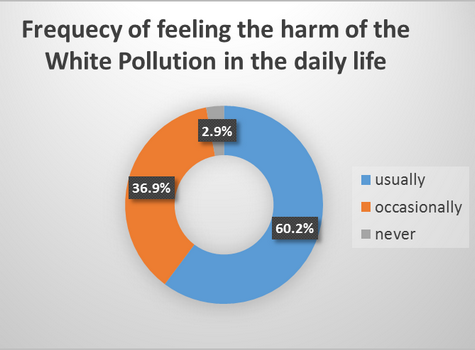Overview On Silver Medal
The silver medal criterion demonstrates that “iGEM projects involve important questions beyond the lab bench, for example relating to (but not limited to) ethics, sustainability, social justice, safety, security, and intellectual property rights. Demonstrate how your team has identified, investigated, and addressed one or more of these issues in the context of your project. Your activity could center around education, public engagement, public policy issues, public perception, or other activities.” Basically we classify our human practice work into five aspects, that is, education, public engagement, public policy issues, public perception and industry, which tallies well with the requirements.
Ⅰ: Primary School
On Sep. 23rd, 2016, we went to Baitangkou primary school to make a presentation, aiming to let more pupils learn about the conception of synthetic biology and arouse the consciousness of fighting against the plastic pollution and protecting our earth. During the class, these primary students answered the questions we raised enthusiatically, which revealed their interests in synthesis biology. The meaningful class ended up with intense debate on how to deal with white pollution.
Ⅱ: Middle School
On Sep.18th, we departed for Dagang No.1 Middle School. We gave a lecture to students about iGEM and synthetic biology. They asked questions with great enthusiasm and felt curious about the knowledge out of books. Although the speech was over till 5:30 p.m., some students were still asking about synthetic biology.They thought that knowledge they studied at school was traditional and out of date, iGEM could make them get in touch with the cutting-edge knowledge of synthetic biology. We are very delighted to bring students some new knowledge and meanwhile we invited them to visit our laboratory and conduct some experiments.
Ⅲ: University
On September 27th, five members of our team went to Tianjin University of Science and Technology (TUST) and gave a speech on what is synthetic biology and how to set up a iGEM team. Almost all the seats were occupied by audience.Since the term of iGEM competition is almost a band new term for them, they showed great interests and talked with us enthusiastically. We gave them a plenty of suggestions according to the experience of our project and finally they claimed that they would recruit members this semester and register for a team next year. .
Ⅰ: Law
Founded in 1992, Dacheng Law Offices ( Dacheng) is one of the first and largest partnership law firms in China. Dacheng Law Offices is home to more than 4,000 licensed attorneys worldwide. Headquartered in Beijing, Dacheng has established not only a national network but also an extensive global legal services network covering the significant cities all over the world.
Its well-designed online network management platform enables Dacheng to share integrated legal services and resources including project information, specialized knowledge, business experience, professional talents and social relations with both its home and overseas institutions on a global basis.

During the winter holiday,we were honored to attend a trial on environment issue and got acquainted with Mr. Licheng Lin, a lawyer from Dacheng Law Office in Beijing. We introduced our project to him and raised several legal questions concerning environmental protection, then he invited us to visit his office and answered our questions with great patience. Mr.Lin’s reply enabled us to have a deeper understanding of legal provisions about environment protection, and we really appreciate his support and help.
Dialogue
- 1. Has China promulgated any laws related to the plastic pollution currently?
No. Now we only have the Environmental Protection Law of the People''s Republic of China, which came into official enforcement as of January 1, 2015. It is the cardinal law for environmental protection in China. This Law is formulated for the purpose of protecting and improving people's environment and the ecological environment, preventing and controlling pollution and other public hazards, safeguarding human health and facilitating the development of socialist modernization. It shows that our nation shall encourage the development of education in the science of environmental protection, aim to strengthen the study and development of the science and technology of environmental protection, and raise the scientific and technological level of environmental protection and popularize scientific knowledge of environmental protection.
- 2. What result has been achieved by enforcing relevant laws and regulations?
With the introduction and enforcement of the environmental protection law, our citizens' consciousness of environmental protection has gradually enhanced and deepened, contributing to the improvement in our environment. As the Environmental Protection Law is called as ‘the strictest law in the history’ by the public,it also has the strongest enforcement. Now many citizens know that all units and individuals shall have the obligation to protect the environment and shall have the right to report on or file charges against units or individuals that cause pollution or damage to the environment. Meanwhile, the people's government gives awards to units and individuals that have made outstanding achievements in protecting and improving the environment.
- 3. Have there been any disputes over environmental issues in China at present?
Yes. Recently, environmental crime is getting increasing attention from the public. With the deteriorated pollution situation in China, the number of environmental disputes is increasing year by year at a high speed. The environmental dispute is complicated, full of uncertainty, and it involves much public interest. Especially in heavy industrial districts, environmental problems have caused much inconvenience, even some serious health threats to local residents.
- 4. In China, what's the severest punishment for environment pollution?
No specific items are defined in environmental laws at the moment, but if the circumstances are serious enough to constitute a crime, the offender's criminal responsibility shall be investigated and dealt with according to law. The newly revised criminal law has added the stipulation on the ‘crime of undermining environmental and resources protection’, providing an effective legal base for intensifying law enforcement and punishing crimes related to environment. The penalty works better than other methods in environment crime domain, however, it produces some negative effects at the same time, so it is important to be cautious before determining guilty and investigating criminal responsibility.
- 5. As our research topic right now is to increase the efficiency of biodegradation plastics, what should we do to apply for a patent if we succeed in development?
If inventors tend to have a fast and safe procedure of patent application, they may choose to entrust professional patent agents. The application mainly has the following steps: inquire about whether your creation is in conformity with the requirement of patent application; if it is, then figure out the patent type; sign the agency agreement and clear the obligation; determine the application; prepare application documents; verify and approve.
- 6. Is the patent admitted in China still applicable in USA?
No. The first thing to clarify is that the exercise of patent is limited to only national sovereignty so that when applied in mainland (except Hong Kong, Macao and Taiwan), the right can`t be extended to USA due to its regionalism. On condition that patent owners hope to get protection in USA, they should submit applications to the United States Patent and Trademark Office in 6 months from the day they file the patent application in China based on the priority of this Chinese application.
- 7. What should we do to safeguard our rights and interests if our intellectual property is infringed?
First, ascertain the number of suspected infringing goods and the scale of operation at the crime scene. Obtain evidence from the same scene for several times. If your evidence can prove the large amount of the infringing goods and the operation scale and your repeatedly forensics can prove the operator sells the infringing goods continually, you may obtain much indemnity.
Second, ascertain the operator`s business information to avoid influencing the lawsuit efficiency due to the litigant`s own problems or other procedure matters.
Third, save the defendant`s website, propaganda materials or information kept at the relevant departments as the preliminary evidences to claim for compensation, for example, the data about their business scope, sales volume, or profits, which defendants profess and submit to some departments.
Fourth, search for the source of the infringing goods proactively and stop the infringement at the origin. In this way, you may obtain more indemnity at the same time.
Ⅱ: Government
A letter for help from Team Tianjin, Tianjin University Respectable Director: Hello! I’m Liyi Xu from the School of Chemical Engineering and Technology, Tianjin University. This year, our university takes part in iGEM( International Genetically Engineered Machine Competition).This year, we conducted an environmental project about biodegrading plastics by microbial organism. So, we’d like to inquire about environmental issues, please: How much plastic waste do we produce per day here in Tianjin? And what methods do we use to dispose the plastic waste generally? What measures will the government take to deal with the plastic pollution problems, now or in the future?
Agency: Hello!Thanks for following us! Team member: I’m a student from the School of Chemical Engineering and Technology, Tianjin University. This year, our team, consisting of 20 members participate in the International Genetically Engineered Machine Competition, and our theme is of environment protection about degrading plastics. Now we’d love to know more about the plastic pollution and its treatment in Tianjin, and how do we dispose the plastic waste generally at present? Would you please answer these questions for us?
Agency: Hello! Plastic for civil use is classified as general plastic, belonging to household waste, and is in the charge of Bureau of City Appearance and Garden, which you may consult for more detailed information. Team member: Hello! I’m Liyi Xu from the School of Chemical Engineering and Technology, Tianjin University. This year, our university takes part in iGEM( International Genetically Engineered Machine Competition).This year, we conducted an environmental project about biodegrading plastics by microbial organism. So, we’d like to inquire about environmental issues, please: How much plastic waste do we produce per day here in Tianjin? And what methods do we use to dispose the plastic waste generally? What measures will the government take to deal with the plastic pollution problems, now or in the future?
Ⅰ: TEDA Eco Centre
Ⅱ: Social Media
In this summer, we team Tianjin contacted Team Pasteur, Team Pittsburgh, Team Valencia UPV, Team Virginia and Team NTU about the questionnaire collaboration. We established and led a survey union with their support. We made a questionnaire about synthetic biology and iGEM competition together through email correspondence.
We posted it on our twitter and facebook, then many iGEM teams reposted it on their homepage and many iGEMers as well as ordinary people participated in it . We are very delighted to see their enthusiastic engagement!

Ⅰ: Questionnaire Survey
We made the public engaged in our project this year with the method of questionnaire survey. Actually we conducted two versions of surveys this year. The former one has been clarified in part Public Perception Ⅱ: Social Media.
As for the latter one, we investigated the daily use of plastic products and the attitude of people towards the bio-degradation of plastic.
The following pictures are our partial results.
Click here to see the full results.
Through the survey, we realize that a majority of people have noticed recent severe plastics pollution and are not satisfied with extant disposal methods. They look forward to a better way to control the ‘white pollution’. Besides, in terms of technology of ‘white pollution’ control, most people have knew something about biological plastics degradation and think highly of it. They hope that scientists will do further research. From the survey we also notice the public consciousness of ‘white pollution’ and how urgent and necessary we should fix this problem. At the same time, it reinforces our confidence and enthusiasm to solve it using biological method. We will definitely make great efforts to explore and figure out something meaningful to live up to public expectation.
Ⅱ: Debate
To make the ordinary students engaged in iGEM, we team Tianjin together with Beiyang Environment-Protecting Association held a debate competition discussing ethical issues provoked by the application of synthetic biology, aiming to publicize the conception of synthetic biology and arouse attention to biotechnology.
The debate began at 20 p.m., Sep.28th and lasted for an hour. The topic was whether it is safe to curb environmental pollution with artificial modified bacterium. Our team members were invited as special guests to watch this intense competition. During the interval, we gave out iGEM handbooks and souvenirs to audience. After that, we made a brief introduction of synthetic biology and our project.
Generally speaking, the debate was very successful. We were delighted to collaborate with Beiyang Environment-Protecting Association. It was glad to see that everyone participating in the game were intrigued by this subject. The successful hosting of the debate epitomized our great publicity of synthetic biology.

Debater

Hostess

FreeDebating
Ⅲ: Fundrasing

GenScript is the leading gene, peptide, protein and antibody research partner for fundamental life science research, translational biomedical research, and early stage pharmaceutical development. Since our establishment in 2002, GenScript has exponentially grown to become a global leading biotech company that provides life sciences services and products to scientists over 100 countries worldwide. During our tenure we have built the best-in-class capacity and capability for biological research services encompassing gene synthesis and molecular biology, peptide synthesis, custom antibodies, protein expression, antibody and protein engineering, and in vitro and in vivo pharmacology – all with the goal to Make Research Easy.
Go To Their Homepage

Synbio Technologies. is building up the first integrated GPS (Genotype, Phenotype and Synotype) system aimed to a quick and easy translation or reverse translation between "Genotype" and "Phenotype" by using our proprietary "Synotype" platform. The company's scientific capabilities encompass areas such as DNA engineering, DNA synthesis, genome synthesis, pathway synthesis, synthetic biology, pharmacogenomics, microbiology, translational biology and the applications of synthetic biology. Synbio Technologies' team has a proven track record regarding translating scientific breakthroughs into cost effective biological solution.
Go To Their Homepage

With operations in Cleveland (USA) and Chengdu (China), AllTech is a multi-national corporation serving the world with state-of-the-art medical imaging products and solutions. AllTech’s multinational leadership and development team members average more than 20 years of experience in the field of diagnostic medical imaging. Prior to joining AllTech these members were leading contributors to the design, manufacture and service of the current generation of MRI products installed worldwide from Western Europe, North America, and Japan to emerging international markets. Over the past years, AllTech has earned a worldwide reputation in the design, manufacture and distribution of Magnetic Resonance Imaging (MRI) systems with cutting edge performance, excellent quality and proven reliability all while delivering world class value.
Go To Their Homepage





